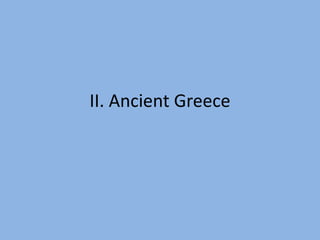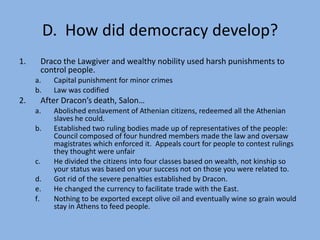Ancient Greece was influenced by its mountainous terrain which led to small independent city-states. These states shared a common language, culture, and religion. Athenian democracy lasted around 200 years in the 5th century BC and allowed native born men to participate directly in governing. It was a direct democracy where citizens voted directly on legislation and executive offices were filled by lot. However, democracy failed in Athens as the people grew greedy and conflict between city-states led to war and instability for centuries. Philosophy developed during this time, with Socrates being executed for challenging Athenian ideals, and Plato believing people should not directly rule and be assigned roles by leaders.








